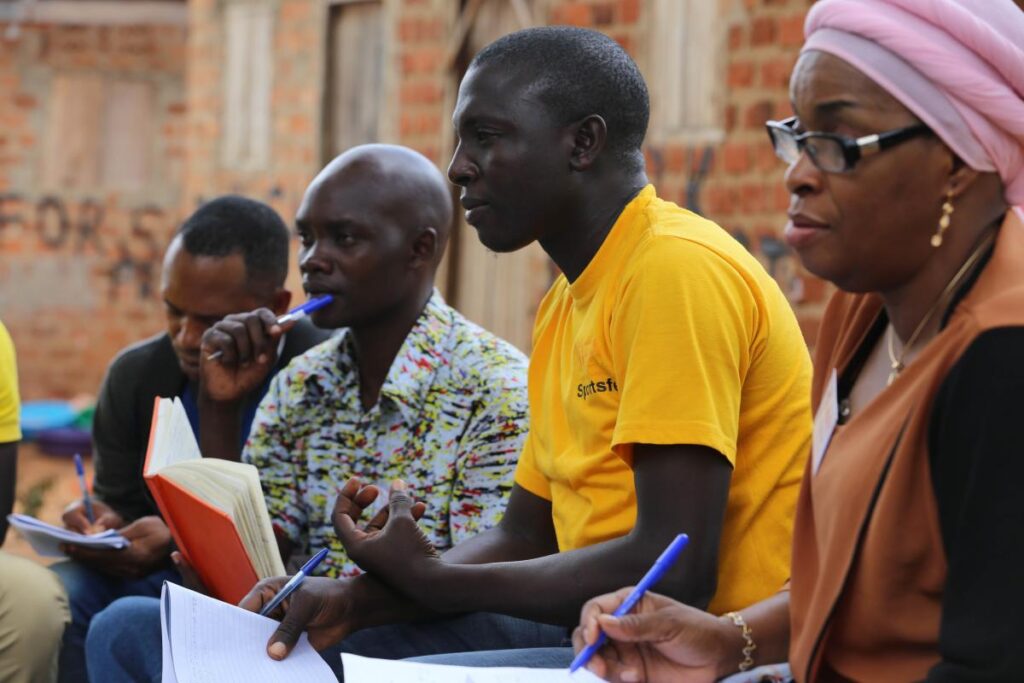By: Samantha Hautea, NextGen Cassava
ZOMBO, UGANDA – This October, researchers with the Next Generation Cassava Breeding project (NextGen Cassava) will launch their first gender-responsive participatory variety selection (PVS) trials in Uganda, after project researchers attended the GREAT Gender-Responsive Root, Tuber and Banana Breeding course (GREAT RTB), which wrapped up in February this year. These trials will engage both men and women farmers in identifying the top cassava varieties for Ugandan consumers and producers.

Participants in the GREAT RTB course work with farmers during the field day. Photo: Chris Knight
“By releasing a cassava variety for the highland areas, we aim to reduce the acreage of the local low-yielding varieties and potentially increase productivity,” said Robert Kawuki, a cassava breeder based at the National Crops Resources Research Institute (NaCRRI), overseen by Uganda’s National Agricultural Research Organisation (NARO). “We will also have the opportunity to gain experiential learning from the process, as the PVS trials will include an assessment of a fermented cassava product locally referred to as ‘kwon,’ in that part of Uganda.”
Selecting cassava varieties for cultivation is a long and daunting process. For example, in 2013, researchers began with 3000 cassava seedlings that were established in the Zombo district of northern Uganda. From these, they systematically narrowed the selection size to the most promising clones, which were then advanced to the subsequent season. In 2016, they identified the top 30 clones for the highlands. These are the clones that will be evaluated under PVS trials.
For the first time, these trials will use a gender-responsive research protocol, developed by researchers who participated in the pilot GREAT course in 2015-16.
Kawuki, a GREAT RTB Fellow, recognizing the need to incorporate what he learned through the course, reached out to two GREAT Pilot course (2015-2016) Fellows in Uganda to help with research design and implementation. Winifred Candiru, a research assistant working with NextGen on social economic research, and Stephen Angudubo, an agricultural economist at Makerere University, will be working closely with other NextGen Cassava researchers to implement the research protocol, monitor the trials, and evaluate the data. Additional support for this project will come from GREAT RTB Fellows Ann Ritah Nanyonjo and Williams Esuma.
“The implementation will involve researchers, farmers and pre-identified agricultural extension workers as well as pre-trained village assistants to guide farmers in collecting data and monitoring farmer-managed fields,” Candiru explained. “Farmers will have the chance to be involved in various stages of the process, including preference analysis and sensory evaluation before and after harvest.”
Farmers selected for participation in the trials will include men and women as well as youth (18-35 years old) and adults (36-70 years old). Evaluation criteria will be developed through group discussion among researchers and farmers. After evaluating how the clones perform in the field, researchers will then conduct a preference analysis and sensory evaluation of the varieties after they have undergone typical processing into the favored local consumable product kwon. Finally, the outcomes from the researchers’ evaluation and selection will be compared with farmer varietal preferences to determine similarities and/or differences.
The aim of the participatory trials is to identify the best performing cassava clones suitable for adoption by the farming communities in the highlands of Uganda. Based on the outcomes of these trials, the top two clones will be distributed and released to farmers. The others will be used for further breeding and development of better cassava clones.
“We see high potential that these new cassava varieties bred for the highlands will not only increase productivity, but do so equitably,” said Hale Tufan, co-principle investigator for GREAT, who is also involved in NextGen Cassava as head of the Gender Responsive Cassava Breeding Initiative. “Designing a PVS trial in a gender-responsive manner increases the likelihood that women, as well as men, will benefit equally from these new varieties.”
Tufan added that she hopes the outcome of these trials will set a precedent for gender responsiveness as a standard in research conducted at NaCCRI. Furthermore, “by engaging Candiru and Angudubo, both researchers from Makerere University, this research project will help GREAT contribute another step toward creating a Center of Excellence at Makerere” for gender-responsive agricultural research – one of the GREAT project’s objectives.
NextGen Cassava is a project funded by a $25 million, five-year grant from the Bill & Melinda Gates Foundation and the Department for International Development (DFID) of the United Kingdom. Both NextGen Cassava and GREAT are managed through International Programs, in the College of Agriculture and Life Sciences at Cornell University, with partners in Africa.





